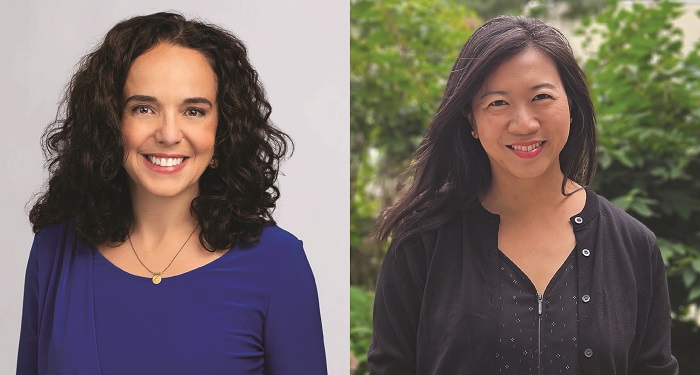Striving for equitable youth mental health care centered on human connection and understanding, and driven by hard data

Youth mental health services are at their best when they’re tailor-made at the individual level, and a team of researchers out of McMaster University are working to ensure no vulnerable population is left behind.
“There needs to be almost a revolution in the way that we approach this because making these small tweaks here and there on the margins just isn't going to cut it,” says Dr. Amanda Sim, an associate professor with McMaster’s psychiatry & behavioural neurosciences department.
“The challenge with really moving forward is that we're so entrenched in how these systems have traditionally been set up to deliver care that it's very difficult to think outside the box.”
Strategizing for complexity
Dr. Sim is one of the co-principal investigators on Reimagining Care: Developing a Strategic Framework in Child and Youth Mental Health for Immigrant, Refugee and Racialized Families, a research project supported by the Catalyst Grant: Standards for Children and Youth Mental Health Services from the CIHR Institute of Neurosciences, Mental Health and Addiction.
The team behind the project are exploring the barriers immigrant, refugee and racialized families experience in accessing youth mental health care, with the goal of informing and co-designing a framework on equitable service provision and access for those populations.
“My vision would be to break down the silos and to have a more integrated, wraparound approach for families that recognizes their strengths and the many complexities and issues they deal with,” said co-principal investigator Dr. Andrea Gonzalez, an associate professor with McMaster’s psychiatry & behavioural neurosciences department.
Barriers to service access in immigrant, refugee and racialized families highlighted by the team are wide-reaching. They include language, stigma, fear of discrimination, navigational issues and eligibility or insurance complications stemming from precarious immigration status. These challenges can become pronounced in families who are new to Canada.
“In some cultures, the idea of going somewhere outside of your family for support is foreign. That doesn't make any sense to them, so they wouldn't know to look for care,” explained Dr. Purnima Sundar, a member of the project’s steering committee and executive director of the Children's Hospital of Eastern Ontario’s Knowledge Institute on Child and Youth Mental Health and Addictions.
“When you add poverty, food insecurity, the inability to navigate the system and the foreign nature of the system alone, all of those things together make it very difficult for newcomers.”
Nuanced understanding of wellness
A system of culturally-relevant care should alleviate those barriers, and centre on relationships and understanding, as opposed to a categorized, by-the-numbers approach.
“It's not sufficient to say, 'if you have an Asian client you need to make sure you do ‘X’, ‘Y’ and ‘Z’ and if you have an Indian client you need to do ‘X’, ‘Y’ and ‘Z’;’ you need to actually focus on a tailored approach,” Dr. Sundar added.
“There's a lot of diversity within each cultural group, and these things evolve over time. The home that my parents left 50 years ago is very different than it is now, and the diaspora has evolved as well. We need to focus on the relationship with the individual patient, rather than trying to become experts in any one culture.”
Ideally, service providers should share an understanding of a family’s cultural background, conceptualization of mental health and experience of migration based on lived experience of their own.
“The way families think about mental health is very much rooted in the social conditions in which they live, including everything from material and financial needs to social interaction and social connections. That can be quite a different approach to mental health compared to traditional services with a more clinical approach,” Dr. Sim explained.
“In addition, communities and cultures where a lot of refugee and immigrant populations come from often see it as a family concept. Their own well-being is inextricably linked to their family's well-being, and so any interventions to address mental health and well being must be rooted in that family context.”
From data to evidence
To establish a new framework on equitable service provision, Drs. Gonzalez and Sim are engaging with and integrating data from partner agencies across Ontario, including the McMaster Health Forum.
“The Forum is a key partner in helping us to gather that information,” said Dr. Gonzalez.
“They're doing all of these stakeholder interviews right now with a variety of perspectives, policymakers, service providers, academics and others across the country, to understand the factors that they need to be paying attention to.”
This research and data will then be merged with the team’s own work on roundtable discussions called ‘family panels’ planned for this fall, where they’ll be gathering insight from newcomer and racialized adults and youth. These consultations will inform the next phase of the project planned for early 2024, the design of an implementation study.
“A lot of the time we know that we produce these beautiful guidelines or strategies and then they just sit on a shelf and gather dust because we haven't paid enough attention to how they can be implemented,” Dr. Sim noted.
“We’ll want to think very carefully about all the contextual factors that could influence uptake: It’s a part of the project we're really excited about because it's thinking through those concrete steps of how we can move these ideas into action. The hope is that by then working with these partners here in Ontario, our work could eventually represent a prototype for others to learn from and model across Canada.”
- Date modified: